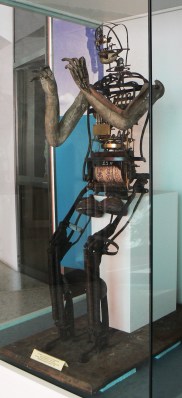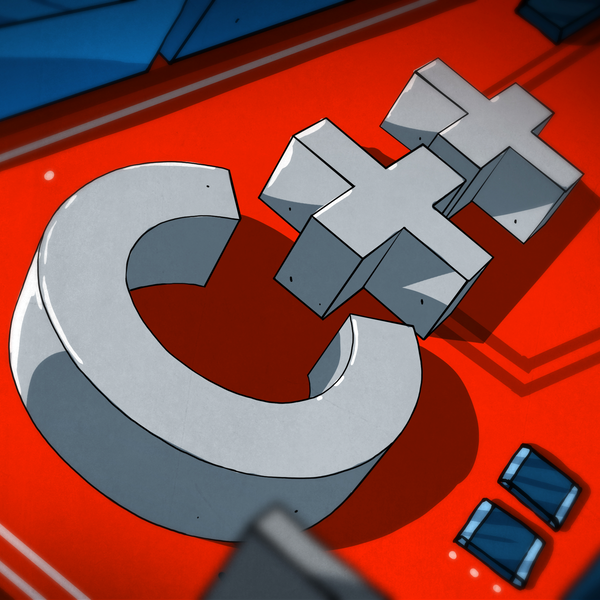
With many words which are commonly used in everyday vocabulary, we are certain that we have a solid grasp of what they do and do not mean, but is this really true? Take the word ‘robot’ for example, which is more commonly used wrongly rather than correctly when going by the definition of the person who coined it: [Karel Čapek]. It was the year 1920 when his play Rossumovi Univerzální Roboti was introduced to the world, which soon saw itself translated and performed around the world, with the English-speaking world knowing it as R.U.R.: Rossum’s Universal Robots.
Up till then, the concept of a relatively self-operating machine was known as an automaton, as introduced by the Ancient Greeks, with the term ‘android’ being introduced as early as the 18th century to mean automatons that have a human-like appearance, but are still mechanical contraptions. When [Čapek] wrote his play, he did not intend to have non-human characters that were like these androids, but rather pure artificial life: biochemical systems much like humans, using similar biochemical principles as proteins, enzymes, hormones and vitamins, assembled from organic matter like humans. These non-human characters he called ‘roboti’, from Old Czech ‘robot’ (robota: “drudgery, servitude”), who looked human, but lacked a ‘soul’.
Despite this intent, the run-away success of R.U.R. led to anything android- and automaton-like being referred to as a ‘robot’, which he lamented in a 1935 column in Lidové Noviny. Rather than whirring and clunking pieces of machinery being called ‘automatons’ and ‘androids’ as they had been for hundreds of years, now his vision of artificial life had effectively been wiped out. Despite this, to this day we can still see the traces of the proper terms, for example when we talk about ‘automation’, which is where automatons (‘industrial robots’) come into play, like the industrial looms and kin that heralded the Industrial Revolution.
(Heading image: Performance of R.U.R. by Flat Earth Theatre, showing the mixing of robot ingredients)

















Thanks Maya!
Could it be possible that we get in future some articles about the root of a modern terms. Something from where come the definition of a.i. or cells, battery…
Who invented CAD, computer aided design, and so on.
Some historical roots of modern hard and software hackers.
Like galileis really nifty telescope, which i think still the build up is more netherlandish/indonesien, especially the use of bamboo strips to keep the tube stiff.
That is the funny thing about words in common use, at least in the US, they change their meaning. Definitions are lagging behind.
Its a real ‘vibe’. I can tell I’m old because the kids have made up new meanings for old words, when perfectly cromulant words already existed.
The kids just wanted to embiggen the dictionary.
Spoken like a true kwyjibo.
we were happy to stick to ’50s surfer slang (usually attributed to the hippy movement) clear into the ’90s. i man it was good enough for the ninja turtles. to replace “cool” with “chill” seems an unimaginative leap, and i still prefer the former.
one would think language would mutate less under globalism where the need for clear communications across language gaps. if you are talking to someone who is using english as a second language, then using clear simple language gives the best chance at good communication.
There it from a young person: “cool” with “chill” mean different things. One hasn’t replaced the other.
“one would think language would mutate less under globalism where the need for clear communications across language gaps”
Why would you think that? To take a biological example, larger populations show more heterogeneity than smaller ones. My assumption would be the opposite: The wider spread a language is the more it will exchange uses, words and meanings with different languages and cultures and therefore the more it will change. I don’t have any evidence either way, but it seems like you’ve jumped to a conclusion without basis here.
Words and meanings change over time. It’s a very common occurrence. Can’t think of another good example at the mo tho …. …. In the meantime, more than happy to keep on using the term ‘Robot’ as we all now commonly seem to understand it.
Terrific used to mean “causing terror” – the change in meaning has by some been traced back to the invention of the roller coaster (possibly apocryphal), which was described in print using the original meaning, but which came to mean “fun” because people found riding a roller coaster to be just that.
Awful used to mean “filled with awe”, which could be caused by either fear or reverence. These days it it mostly applies to the former (or to “disgusting”) rather than the latter.
Artificial used to mean “full of skilled artifice”, and “amusing” used to be a synonym for “amazing”. So describing a building as “awful, amusing, and artificial” would at one time have been high praise.
Slang words play a role in changing meanings, if and when they become mainstream – like wicked (“wicked awesome”), bad (“he be bad”), or sick (“That is sick!”).
I thought “amuse” was an antonym of “muse”.
“Elves are wonderful. They provoke wonder.
Elves are marvellous. They cause marvels.
Elves are fantastic. They create fantasies.
Elves are glamorous. They project glamour.
Elves are enchanting. They weave enchantment.
Elves are terrific. They beget terror.
The thing about words is that meanings can twist just like a snake, and if you want to find snakes look for them behind words that have changed their meaning.
No one ever said elves are nice.
Elves are bad.”
― Terry Pratchett, Lords and Ladies
Maybe “Awful” which used to mean something which filled you with awe, not disgust.
Also, coining a term which suddenly goes viral in the lexicon does not confer upon its creator any sort of control. Tough but that’s how it works.
Gif
I wonder if he lived long enough to learn that robot is South African english for traffic lights. At least one angry column there.
Karel as a prominent voice of democratic Czechoslovakia was subject of a strong hate campaign after the Munich Agreement. He fell ill and died on Christmas 1938.
Josef was arrested by Gestapo in their campaign against Czech culture and intelligence in 1939 and died a few days before the liberation of the Bergen-Belsen concentration camp of typhoid infection.
Not sure since when South Africa uses traffic lights but I doubt that.
Well I think if somebody wanted to describe a biological humanoid creature (without a soul) today they would probably use something like clone. If there’s one thing you can say about language it’s not logical.
If such a thing could exist we probably shouldn’t use an existing word that means something completely different. Perhaps creating a new word would be better. Biobot anyone?
We’ll leave to one side the scary, and I hope unintended, implication of your post that you seem to think identical twins (who are natural clones) don’t have souls (whatever those are)!
Um… Twins are twins, not clones. One of the twins were not duplicated from the other, they just had the same origin point. For them to be clones, one would have to form then be copied.
“describe a biological humanoid creature (without a soul) today they would probably use something like clone.”
I don’t think clone would be the best word. Perhaps “politician” would be more accurate for this definition…
So the original idea was more like Frankenstein’s monster.
It is indeed quite annoying that the word “robot” is used for so many completely different things. From the Industrial robots, to remote controlled or semi-autonomous things driving around on wheels or walking on legs to web crawling software.
I am mostly interested in the industrial kind myself. Those have more descriptive sub sections (Articulated, SCARA, Delta, Stewart Platform, etc) Depending on how the axis are connected to each other.
3D printers are usually not called CNC machines. CNC machines are starting to mix additive and subtracitve machining techniques, and in the aerospace industry extremely complex contraptions have been made for winding carbon (and other) fibers into weird shapes…
I’m in industry as well. I don’t know if our definition is correct, but it always gives me a cringe when the tethered wheelie things are called robots. One of the teams needs to change terms for these vastly different machines.
You make another interesting point about CNC, which, for those who don’t know, originally distinguished motorized machine tools driven by computers (the first C) versus a medium like punched tape (the NC part). The NC part distinguished motorized machine tools from those driven by hand.
In Polish “robota” mean just “work” without negative sentiment, usually meaning physical work. Robotnik is a human worker and robot is an automaton which performs work.
Stanisław Lem in “The Futurological Congress” coined terms for all kinds of robots – more than I would dare translating into English. Names for robots which are primitive (so they work), robots intelligent enough to realize that they don’t have to work (they are non-working robots, “nierobot”). These are further split into robots which are lazy, those who find excuses and those who play stupid.
I expect we will need those names for various kinds of LLMs quite soon.
Also in Russian, “работа” (rabota) means work. Ukrainian has “робітний” (robitnyy).
It’s Polish or Czech (I forget) for “labor,” correct? A soulless creature that can be used for work? In that case the term robot is pretty much on target.
For sur in Polish (not sure for Czech).
Replicants in Blade Runner (at least in movie) seem to be robots. In Poland Blade Runner was translated more less as “Android Hunter”.
Reminds me of the good old days in the LMR community and the philosophical debates about what a robot was.
Pity what happened to that site it was a really great hangout.
I used to work with a bunch of Czech guys. We would joke about “rabatta” as they called it. Most akin to slave labor or labor for nothing.
Like the Huey Lewis song “Bad is Bad”, different meanings for the same word.
HaD posting about using words incorrectly….that’s rich. (not the specific author, just HaD in general. Caught it too many times to even post about it!
Any linguists in the audience will understand why it’s funny that the closest term we have to a Czech guy’s “robots” is “artificial slaves.” ;)
A “The Princess Bride” fan here, dropped in to leave a “like” and a comment:
“Inconceivable!”
It means exactly what I think it means, because words are defined by their general, present usage. Language exists to communicate ideas between each other, and all that matters is that there is a shared understanding of the idea encapsulated by the word. As a result of this, meaning shifts over time. It can expand to become more general, it can contract to be more specific, or it can just take on entirely different meanings all together.
The word “nice” used to originally mean “foolish.” I don’t see many articles about how people keep using that word but they don’t know what it means.